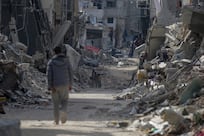Dubai is bringing more transparency to the way it is managing its economy, by forecasting growth not just for the overall economy but for its key sectors including real estate and tourism.
On Sunday, Sheikh Ahmed bin Saeed Al Maktoum, the chairman of Dubai’s Economic Development Committee (who holds other key positions such as chairman of Emirate) said investments will lead growth this year and in 2018, while also providing growth forecasts for the Emirate's real estate, tourism and manufacturing sectors, tipped to be the main engines of growth going forward.
Meanwhile Sami Al Qamzi, the director general of Dubai Economy, revealed a growth forecast of 3.6 per cent for next year, in line with projections from the International Monetary Fund.
It is no surprise that the catalyst for growth for this year and 2018 will be investments, particularly those related to preparations for Expo 2020. Economists at the IMF and the Bank of America Merrill Lynch concur that the UAE's medium term non-oil growth will reach 3 per cent or higher, thanks to investments in the lead-up to Expo 2020.
Although forecasts are difficult and may sometimes miss their targets, such predictions are important for setting economic policies. They give an insight into government strategies and show their consistency over time. Predictability of government policy is important, especially in a world marked by economic uncertainty and political volatility.
Over the last few years, Dubai has adopted a number of measures towards being more proactive when communicating with key stakeholders as it continues to chart its way forward after rebounding from the 2008 financial crisis.
For example, in January Sheikh Ahmed said the emirate will publish its economic outlook twice a year.
Dubai has also crafted several policies aimed at pushing further its diversification agenda. The Dubai Industrial Strategy 2030, unveiled last year, predicts that promoting six key industry sub-sectors will help add Dh160bn to the emirate’s GDP by 2030. Manufacturing was highlighted as one sector that will help boost growth this year and in 2018, growing at a pace of 3.3 per cent and 4.1 per cent respectively.
More economic transparency of this sort is a welcome development, especially as Dubai embarks on a number of initiatives aimed at transforming the emirate into a leading global economy, all the while setting itself ambitious growth targets.
In many respects Dubai's proactive engagement is like a publicly listed company adhering to corporate governance and reporting standards. That is to be lauded.




